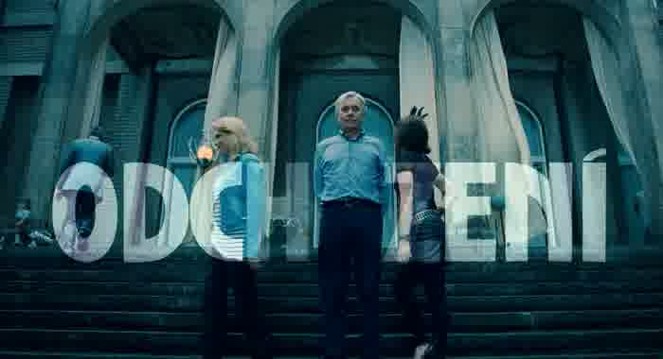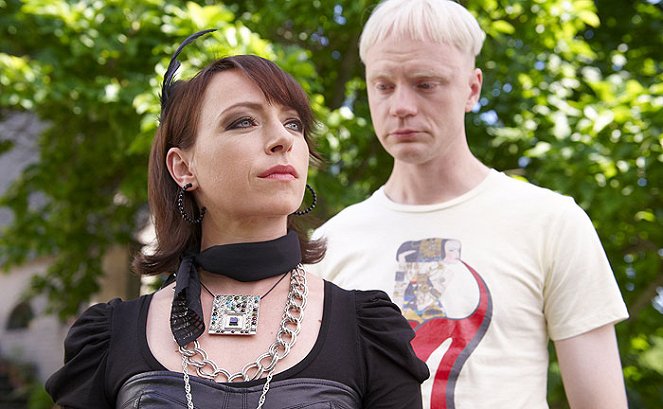Directed by:
Václav HavelCinematography:
Jan MalířComposer:
Michal PavlíčekCast:
Josef Abrhám, Oldřich Kaiser, Dagmar Havlová, Jaroslav Dušek, Tatiana Dyková, Eva Holubová, Vlasta Chramostová, Jiří Lábus, Jiří Macháček, Josef Polášek (more)Plots(1)
Vilém Rieger held the office of Chancellor for many years and now can’t come to terms with the fact he has been ousted. His world has collapsed, as well it might since he also has to move out of the government villa that has become home for himself and his family. While he undergoes the humiliating process of separating government-issue property from his own private things, he involuntarily embarks upon an inventory of his relationships with the people around him. In the process he discovers that he never actually knew his family or his colleagues at all and is now in danger of being manipulated by everyone in his midst – including those closest to him. Václav Havel based his directorial debut on his own stage play which he began writing back in the summer of 1989, before the political changes occurred, propelling him towards the presidential office. The film adaptation of Leaving, a play within the poetic mode of absurd theatre, thus tinkers with autobiographical elements, but it is not the story of Havel himself. Musings on the powerlessness of the powerful in the face of their own ego call to mind Shakespeare’s King Lear and Chekhov’s The Cherry Orchard. (Karlovy Vary International Film Festival)
(more)Videos (3)
Reviews (7)
If someone other than Václav Havel had directed that movie, I would absolutely dismiss it. The play on the same topic in the theater is excellent and it is very apparent that it should have stayed in the theater. The limited space of the stage actually helps it, as there is not much room to expand. The movie is a showcase of great Czech actors and somewhat of a tribute to itself, but sadly, that's all.
()
* 18/12/2011 :-( Absurdist theatre on the screen and nothing else. Leaving doesn’t have that much charm, it’s not very funny, but that doesn’t matter if you are willing to listen to it. What’s a little amazing, and also a shame, is that after an entire life wishing to make a film, Havel didn’t make his (unfortunately) only film more “film-like”. But I don’t regret the ninety minutes I spent with Leaving. Václav Havel was just too smart a person to make a silly or uninteresting film. And after reading the comments of certain individuals, he’s someone we might have not been worthy of as a nation. Honour your memory.
()
Václav Havel is no longer a dissident or president, he is now just a celebrity. For him, it is of course not difficult to gather a whole bunch of money and fulfill one of his dreams by making a feature film. The money is willingly donated by a well-known billionaire, a number of leading Czech actors consider it an honor to participate in the project, and the same goes for other film professions. Practically no Czech film in recent years can be said to have had such intensive PR as Leaving. Reports from the filming appeared in the media, interviews with actors who acted as if they had just taken a drug causing euphoria, and judging by these reports, it was supposed to be the film experience of the year. Therein lies the problem, because Leaving, with its content and film techniques used, is more of a film intended for the related audience in a film club. In reality, for example, Leaving was shown at a particular movie theater in 4 versions during the best screening times, which only happens to the biggest box office hits. The same movie theater boycotts films by the Coen brothers or Polanski because it considers them to be not commercial enough. The problem is also with the source material because the play of the same name was considered a theatrical event of the decade in the Czech Republic, but in the world, it received only a lukewarm reception and can be described as purely average. A top-notch film cannot be created from an average work, especially when the director has no previous film experience. Of course, this is not a catastrophe because the film crew, whether the camera, music, or cast, is truly among the best Czechs currently have. But it's a typical film meant for "blowing off steam." If it weren't for the eager fans among journalists who consider Havel to be a symbol of democracy and an unquestionable figure, and a similar group of oppositely inclined people who need to settle their scores with Havel for the same reasons, and thus their passionate debates fill the media, that film would simply and plainly disappear from theaters due to lack of audience interest and would sporadically appear in uninteresting times on public television... Overall impression: 40%.
()
Such a colorful mausoleum of Václav Havel. The film is so terribly overloaded with intentional absurdity, tastelessness and diverse influences that any sting of the original text disappears in it and, unfortunately, its meaning is equally flawed. It is exactly the same syndrome that the Theatre on the Balustrade is dealing with after the death of Petr Lébl. Mixing Chekhov, Shakespeare, a Western, the First Republic, totalitarianism, entrepreneurial Baroque and many other ingredients so that the result has a clear meaning and really says something... that is the prerogative of great directors. And that's just not what Havel (with all due respect to him) is. Leaving is quite cute and fun in places, but as a whole it feels colorless and unnecessary. I don't know what the poet was saying - although otherwise, I like his verses very much.
()
I never had a particularly strong relationship with Václav Havel, as a politician he had his pros and cons, but as a playwright he was always much more interesting. I have seen Leaving twice at the Pilsen theatre and, although many of the symbols and double and triple meanings in it have remained hidden from me, I still consider it to be Havel's most comprehensible work. I was therefore looking forward to the film. The plot is not worth discussing - if you like (not only) Havel's absurdist pieces, his distinctive poetry and even more distinctive humor that makes you think, you will find it to your liking. If not, you will probably be disappointed or even annoyed by Leaving. It's hard to say whether the audience will form a third, middle camp in addition to these two. Yet everything except the plot requires more attention. First of all, it's the actors, actresses and their roles and parts. I can't help but think that every single person who appeared on screen was excellent and had their place. I especially appreciated the idea - thank God for that - to cast actors like Holubová, Dušek, Vilhelmová or Budař in completely different characters than they are known for (i.e., not smiling, not vulgar... etc.). Josef Abrhám was simply excellent, Dagmar Havlová was amazingly cold, the "Klaus-like" Kaiser and Lábus prove that small roles really don't exist... And I could go on and on. Pavlíček's music (the variation on “Rusalka" is perfect) and Malíř's cinematography also contributed significantly to Leaving. As for the direction... It’s a bit worse. I'm not saying bad, not at all (The Tempest, for example, is an absolutely riveting scene), but it didn't convince me that I was watching a movie. In short, it was still theatre, filmed with a movie camera for big money and shown in a movie theatre. For this not-so-perfect illusion, I'm taking a star off, but even so, Leaving gets a pure four stars, which is increasingly rare in Czech cinema lately.
()



Ads